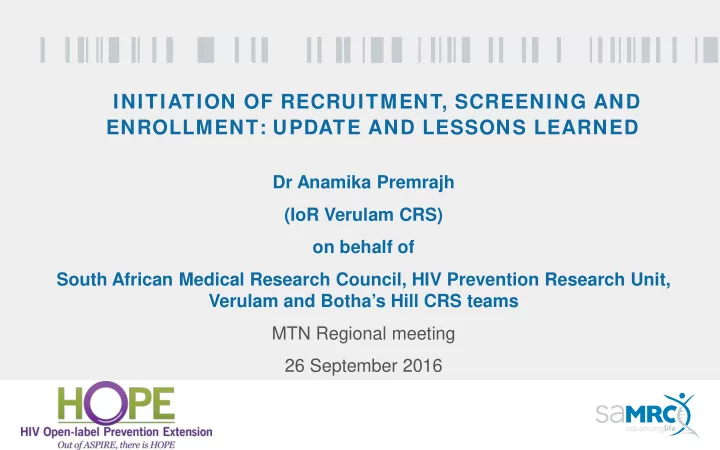

INITIATION OF RECRUITMENT, SCREENING AND ENROLLMENT: UPDATE AND LESSONS LEARNED Dr Anamika Premrajh (IoR Verulam CRS) on behalf of South African Medical Research Council, HIV Prevention Research Unit, Verulam and Botha’s Hill CRS teams MTN Regional meeting 26 September 2016
OVERVIEW • Clinical Research Site Update • Recruitment Successes • Recruitment Challenges • Screening/Enrolment Visit – HOPE Main Study • Screening/Enrolment visit – Decliner Population • Month 01 – Follow up visit • Recap - Recommendations
CLINICAL RESEARCH SITE UPDATE Verulam CRS Botha’s Hill CRS Date of Activation Screening - 16 July 2016 14 September 2016 Enrolment – 13 August 2016 Date of first Screening 18 July 2016 15 September 2016 Total Screened 16 3 Total Screened Out 2 0 Date of first Enrolment 15 August 2016 First Enrolment scheduled for 05 October (HOPE Main study) Total Enrolled 7 (HOPE Main Study) N/A 2 (Decliner Population)
RECRUITMENT SUCCESSES • Step 1: March 2016 - Contacting and Engaging former ASPIRE participants individually • Step 2: May 2016 - Group Meetings with Former ASPIRE Participants - C hoice, A dherence and A ccurate R eporting (CAAR)– to feedback to HOPE Engagement Workshop • Step 3: June 2016 - Pre-screening workshops in small groups at least weekly – CAAR Principles, Gauge Response to HOPE • Participant Responses: • Embraced idea of CHOICE in the study and the use of a female controlled HIV prevention method • Participants on placebo in ASPIRE are grateful for the choice to use active product • Quarterly visits • Glad to have less visits • Concern regarding storage of ring during quarterly visits – monthly interim visits offered for ring collection.
RECRUITMENT CHALLENGES CHALLENGES STRATEGIES Not contactable telephonically Home visits; communicated with other contacts listed on the Locator form Participant Relocated Offer follow up in HOPE at closest alternate clinic. HIV Seroconversion post ASPIRE No longer eligible, offered referral to care. Pregnant or breastfeeding Checked on EDD, participants are eligible if no longer pregnant and breastfeeding Participant now working, no time for visits Saturday clinics, early clinics, late clinics offered
SCREENING/ENROLMENT VISITS – MAIN STUDY Recommendation Reason Mock visits – practice sessions Helped to determine visit flow. Pay attention to HOPE Protocol and Many procedures differ between ASPIRE and SSP – Note differences from ASPIRE HOPE. Discuss Audio recording of Options Participants need time to become comfortable with counselling from Pre-screening HOPE idea of recording of counselling session. education Develop a script for verbal consenting Guides staff with documentation of the process, process for recording of Options especially for the first time counselling. Medidata entry –have staff dedicated for Medidata entry can be time-consuming especially if data entry; use training programme. new process
SCREENING/ENROLMENT VISITS – MAIN STUDY Challenge Strategies/Action Taken HOPE paper CRFs CRF completion guidelines utilised; Feedback provided to were not user friendly SCHARP – new CRFs developed Risk reduction Counsellors to be mindful of this during counselling counselling at sessions at enrolment – especially if different staff conduct Enrolment- part of pre and post- test vs Options counseling Options Counseling Vaginal ring tracking Need to flag this for completion at follow-up visits; file with CRF – New Product log; easy to miss this CRF Medidata Yes/No Complete as eCRFs; reduces burden of completion of Prompt CRFs unnecessary paper CRFs
SCREENING/ENROLMENT VISIT– DECLINER • Verulam site – two participants enrolled in Decliner population • Visits were conducted on-site. • Reasons for declining – one indicated she had Adverse Events in ASPIRE and therefore did not want to participate in HOPE; the other declined due to the blood draws. • Visit considerations • Procedures include IC, Eligibility and behavioural questionnaires. • Plan for off-site visits for this population; ensure privacy and confidentiality if done off-site.
FOLLOW-UP - MONTH 1 VISIT • Verulam CRS – completed 3 Month 1 visits • Visits went smoothly • All participants agreed to continue ring use. • One participant did not agree to recording of Options counselling. • Challenge – Hair Collection • One agreed to hair collection • One agreed to hair collection at this visit but not for future visits • One refused – she had short hair, did not want patch of baldness • Anticipated to be a challenge for many participants • Possible reasons for declining • Cosmetic • Religious/cultural beliefs • African Hair takes long to grow • Suggestion – Video to show the amount of hair that is cut and the process.
RECAP - RECOMMENDATIONS • Keep good records of contact outcomes with participants during the accrual period. • Pre-screening workshops assist in engaging with participants and to keep discussions about Choice, Adherence and Accurate reporting ongoing • Highlight differences in procedures between HOPE and ASPIRE during training the process and during mock visit sessions • Mock visits also aid with visit flow • Highlight audio recording of Options Counseling and Hair collection procedure from the screening visit to participants (or during pre-screening education) • Develop a script for verbal consent. • CRF Completion guidelines – keep these handy • Medidata • Practice using the training programme; eliminate unnecessary paper CRFs • Teamwork is essential for Activation and communication is key!
ACKNOWLEDGEMENTS • Participants and the Community • Prof. Gita Ramjee, SAMRC CTU PI and National PI for South Africa • HPRU support and research teams – was a team effort getting ready for Activation • FHI 360 team: Ashley Mayo • SCHARP: Jennifer Berthiaume, Melissa Peda • The Microbicide Trials Network is funded by the National Institute of Allergy and Infectious Diseases (UM1AI068633)
Recommend
More recommend